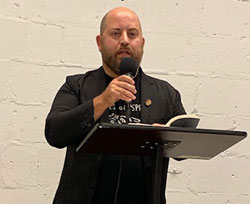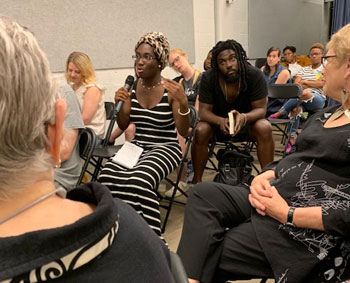|
Anyone who cares about the current political situation in the United States of America is thinking about racism and how it affects the self, the groups we are part of, and the country we live in, whether that country is the USA or not. For a small bite of context, the Steiny Road Poet offers this selected list of books published in 2019 on this topic:
What Doesn’t Kill You Makes You Blacker by Damon Young (3/26/19)
“From … one of the most read writers on race and culture at work today, a provocative and humorous memoir-in-essays that explores the ever-shifting definitions of what it means to be Black (and male) in America.” Good Reads
How to Be an Antiracist by Ibram X. Kendi (8/13/19)
“In this book, Kendi weaves together an electrifying combination of ethics, history, law, and science, bringing it all together with an engaging personal narrative of his own awakening to antiracism. How to Be an Antiracist is an essential work for anyone who wants to go beyond an awareness of racism to the next step: contributing to the formation of a truly just and equitable society.”
Good Reads
Dying of Whiteness: How the Politics of Racial Resentment Is Killing America’s Heartland by Jonathan M. Metzi (3/5/19)
“Physician Jonathan M. Metzl's quest to understand the health implications of ‘backlash governance’ leads him across America's heartland.Interviewing a range of everyday Americans, he examines how racial resentment has fueled pro-gun laws in Missouri, resistance to the Affordable Care Act in Tennessee, and cuts to schools and social services in Kansas. And he shows these policies' costs: increasing deaths by gun suicide, falling life expectancies, and rising dropout rates.”
Good Reads
Also, here is a book published 7/14/15 that has spent 85 weeks on the New York Times Best Seller List: Between the World and Me by Ta-Nehisi Coates.
“Coates takes readers along on his journey through America's history of race and its contemporary resonances through a series of awakenings—moments when he discovered some new truth about our long, tangled history of race, whether through his myth-busting professors at Howard University, a trip to a Civil War battlefield with a rogue historian, a journey to Chicago's South Side to visit aging survivors of 20th century America's 'long war on black people,' or a visit with the mother of a beloved friend who was shot down by the police. In his trademark style—a mix of lyrical personal narrative, reimagined history, essayistic argument, and reportage—Coates provides readers a thrillingly illuminating new framework for understanding race: its history, our contemporary dilemma, and where we go from here.”
 |
On August 13, 2019, Steiny went to hear Jess Row read from his newly published book (8/6/19) White Flights: Race, Fiction, and the American Imagination at Politics and Prose at Union Market in Washington, DC. The reading was also a conversation with Rion Amilcar Scott, author of the forthcoming book (8/20/19) The World Doesn’t Require You.
To set the scene, Steiny noticed that this branch of Politics and Prose—a noted bookstore with its flagship store located in the predominately white upper northwest of Washington, DC—is in Union Market, the hip neighborhood of Northeast DC where predominately young folks of all ethnicities congregate. Given the number of chairs set out (maybe 30), the bookstore got the audience expected, including several Black intellectuals and mostly a youngish crowd.
While Steiny didn’t read the entire book before Row’s reading, she did read the first essay “Eating the Blame: The Question of Reparative Writing,” half of the second essay “On Seeing, Waking, and Being Woke,” and parts of the title essay “White Flights.” The title of the book is intriguing but puzzling because of the plural applied to flight. Initially, Steiny linked White Flights to the American Imagination and Fiction more than to the word Race, where race made her think of white people abandoning an inner-city neighborhood for the suburbs because minorities were moving in.
 |
Row introduced his reading by saying White Flights is (in this order): “a book about books, a personal story, and a cultural story” as well as “a book about the soul.” He said if W.E.B. Du Bois had not already pre-empted the title with his book The Souls of Black Folk, Row might have called his book The Souls of White Folk. Hearing this put things in perspective for Steiny. Also Row’s strong admiration for James Baldwin and Toni Morrison made it clear that the first order of business for Row is excellent writing.
For Steiny, White Flights: Race, Fiction, and the American Imagination is a well written book with excellent craft— good word choice, sentences, and paragraphs. His threading of contemporary literature into his discussion of his life and his personal struggle with racism reminds Steiny about how Gertrude Stein sat for three months in the British Museum reading every novel written in English that was catalogued there. Her goal was to learn the craft of writing and then to exceed those standards because she wanted to stand out and rise about the habitual and because if she could do that, then, by standards set by her Harvard University teacher William James, she would be known as a genius.
Jess Row is the white kid who grew up in privilege—private schooling and an Ivy League graduate—who had to re-educate himself and reform his identity to deal with injustice he felt he was participating in. Something like Stein who had private tutors and an Ivy League degree but who went on to hide her identity in Paris where she could live quietly unimpeded as a Lesbian. Her identity was rocked when a woman whom she loved dumped her and went on to marry a man. Of course, Stein lived in a much more culturally repressive time and was not without her own contradictory prejudices. Row’s identity crisis, as revealed in degrees throughout the set of essays, becomes clear in “White Out,” the last essay of the book. His grandfather had appropriated North Dakota land from the Lakotas. Row’s ability to finance graduate school to get his Master of
Fine Arts came from his grandfather’s estate. Had Scott not asked Row during the conversation between them how Row was making reparations for racism, Steiny would not have gone on to read the last essay of the book. Row’s answer was that he negotiated with the Lakotas to give his first advance check from White Flights to an artist collective on Lakota land. Row said this was not to buy his way out of guilt but to establish a relationship.
After hearing Row read from “On Seeing, Waking, and Being Woke,” and “White Flights” as well as the conversation between the author and his interviewer, questions surfaced for Steiny. Can a white author write meaningfully about racism without exploiting the subject matter? Did Jess Row address other kinds of current day injustices that are often lumped in with the discussion about racism, such as gender inequalities and sexual biases against the LGBTQ communities? Maybe the only kind of injustice not addressed in White Flights was that experienced by the elderly community because, in truth, this story rests heavily on concerns about youthful identity. In fact, to a large degree, Steiny sees this set of essays as culminating in an epiphany about finding the authentic self.
So yes, Steiny is satisfied that this book can stand with other new books on racism, particularly like Kendi’s How to Be an Antiracist. She does think, however, that this book is a hard one to present in a one evening event and that’s why questions arose. She also thinks that the primary title White Flights speaks more to the literary concerns of the book than to race. Now, Steiny is going to comb through White Flights: Race, Fiction, and the American Imagination to enhance her own reading list.
|